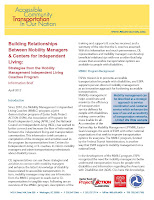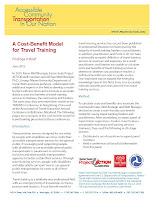Effective
Transportation Advisory Committees
Transit agency and transportation-focused advisory committees engage customers, citizen advocates and
business owners in the process of developing successful initiatives,
identifying service needs and resolving problems. This 20-page guidebook is
designed for transit agencies that are considering creating an advisory
committee for the first time and for agencies that are looking to get the most
value from their current advisory committees. Sections include Purpose, Structure and Membership;
Making Meetings Accessible; Orientation; Running a Meeting; and Community Involvement. Download
or order free copies of Effective
Transportation Advisory Committees.
Developed in partnership with the American
Bus Association, the Motorcoach
Operator's Bookmark provides guidance to motorcoach companies,
drivers and others who serve passengers with disabilities. The front side
includes information on U.S. Department of Transportation Americans with
Disabilities Act regulations on service animals and the back side includes tips
on customer service for people with disabilities. Download
or order free copies of the Motorcoach
Operator's Bookmark.
Building Relationships
Between Mobility Managers & Centers for Independent Living
This information brief contains a compilation
of the strategies and activities used by representatives from Centers for
Independent Living (IL coaches) in the Mobility
Management Independent Living Coaches (MMILC) Program. The program’s
purpose was to inform mobility managers and other transportation
professionals about disability issues, and engage human services professionals
in mobility management. CILs and human services organizations can use these
strategies and activities to support their linkages with mobility managers and other
transportation providers. In turn, mobility managers may also use information
from the MMILC program detailed in this resource to reach out to CILs. Download
Building
Relationships Between Mobility Managers & Centers for Independent Living.
In 2010, Karen Wolf-Branigin, M.S.W., ESPA
staff member, and Michael Wolf-Branigin, Ph.D., George Mason University
Department of Social Work associate professor, collaborated with additional
experts in the field to develop a model budget with line items and a formula to
ascertain distinct costs and benefits of travel training services to trainees,
the community and funders. The same year, they presented their model at the
TRANSED conference in Hong Kong, China and at the Association of Travel
Instruction Annual Conference in Baltimore,
Md. This new resource is a
synopsis of the cost-benefit model for travel training presented at these
conferences. Download
free copies of A
Cost-Benefit Model for Travel Training.





No comments:
Post a Comment